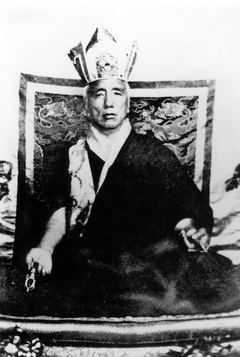Acrostic Song
English | Deutsch | Français | བོད་ཡིག
An Acrostic Song
by Jamyang Khyentse Chökyi Lodrö
Ahoy, yogins and yoginīs!
Be not indifferent but practise Dharma!
Care for yourselves, my friends of leisure.
Do not conduct yourselves as I do:
Eschew clamour and distraction.
Fashion yourselves however you wish.
Give up craving for tea, alcohol and food.
Have no wish to wander about like the oblivious.
Integrate the Tathāgata’s teachings,
Joining their various elements as one.
Knowing that we’re fortunate to be together now,
Let us practice the Dharma continuously.
Most forms of erratic behaviour
Necessarily lead others to lose faith.
One must not simply lie about like a cow.
Provide maternal loving care for all.
Quite as lovely and appealing as a camara,[1]
Remain invulnerable to the heat and cold.
Strive for the constancy of the Ganges as it flows.
Take to mountain retreats like a fox to his den.
Upon your head as a hat wear the guru’s visualization—
Vivid, never forgotten even for so much as a moment.
While avoiding hectic and trivial activity,
Execute only refined conduct at all times.
You must strive to be as stable as Ramaṇa,[2]
Zealous not sporadic throughout your whole life.
Pass, like a deer, through every stage,
And reach the end of the ten bhūmis.
With a roar of laughter, “Ha! Hi!”
Let us realize the meaning of A, the unborn,
And empty the pit of saṃsāra from its depths.
By Chökyi Lodrö.
| Translated by Adam Pearcey with the generous support of the Khyentse Foundation and Tertön Sogyal Trust, 2020.
Bibliography
Tibetan Edition
'jam dbyangs chos kyi blo gros. "ka rtsom mgur ma/" in ’jam dbyangs chos kyi blo gros kyi gsung ’bum. 12 vols. Bir: Khyentse Labrang, 2012. W1KG12986 Vol. 8: 339–340
Version: 1.2-20230714
